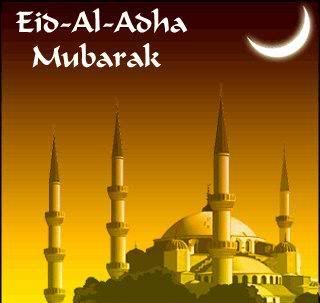 SARAJEVO, Bosnia (December 22,2007) - The Muslim holiday of Eid Ul-Adha (Kurban Bajram) started on Thursday, December 20. The central ceremony in Bosnia was held in the Gazi Husrev Beg’s Mosque in the Bosnian capital Sarajevo. Head of the Bosnian Islamic community Reisu-l-ulema Mustafa ef. Ceric led prayers and the religious services.He congratulated Eid Ul-Adha (Kurban Bajram) to all Muslims in Bosnia and in the rest of the world. In Reisu-l-ulema’s greetings,he said:
SARAJEVO, Bosnia (December 22,2007) - The Muslim holiday of Eid Ul-Adha (Kurban Bajram) started on Thursday, December 20. The central ceremony in Bosnia was held in the Gazi Husrev Beg’s Mosque in the Bosnian capital Sarajevo. Head of the Bosnian Islamic community Reisu-l-ulema Mustafa ef. Ceric led prayers and the religious services.He congratulated Eid Ul-Adha (Kurban Bajram) to all Muslims in Bosnia and in the rest of the world. In Reisu-l-ulema’s greetings,he said:"Dear brothers and sisters,
Hajj is a sacrifice, within which man comprehends what his place in the universal world, Arefat, where the first man realized his place upon Earth, is. That is a homeland journey of man who, through his own witnessing, finds the universal reason of life, and who, in the God’s message Qur’an, finds hope for own redemption.
Sacrifice is the man’s journey in getting closer to the Creator, as is a prayer the sacrifice of every religious person, or, in other words, every religious person wants to get closer to his Lord through prayer. For he, who is close to God, is close to man who needs human love and help.
Therefore, wish upon your brother what you wish upon yourself!
Be a support to your brother and he will be a support to you!
The dearest deed, to God, is that man gifts happiness to his brother!
The best of the virtues of observance is to renew the ties to family and friends, to give gift to the one who angered you, to forgive the one who did injustice to you!
Therefore, Eid Ul-Adha (Kurban Bajram) is the festivity of an individual, a family, and the universal being of Muslims. The essential message is for man to get closer to Allah, dz.s., by way of sacrifice of kurban, which has, as its goal, to help mankind. Therefore, faith is, in essence, that people get closer in love and good deeds. So it is important that in this Eid Mubarak, again, we be together, we forgive one another, we help each other, especially those among us who are elderly, weak and ill. Let trust be among us and let there be the rule of peace and goodwill in all of the world.
To all Muslims, those who today walk in prayer around the Kaba, and to those who are at their homes gathered around the sacrificial lamb, I wish, from my heart, a happy Eid Ul-Adha (Kurban Bajram), all the while praying to dear Allah for their health and success in life and work. I extend special greetings to the refugees, the sick and powerless, with submission to the Creator Almighty to help them! Personal greetings to our brothers in Croatia, Slovenia, Sanjak, Kosova, Macedonia, Montenegro, Serbia, and the Bosnian Diaspora and all of the Muslims in the world."

Eid Ul-Adha,or Eid-e Qurban (Kurban Bajram) occurs on the tenth day of the Islamic month of Dhul Hijja. It is one of two Eid festivals that Muslims celebrate. Eid Ul-Adha is celebrated by Muslims worldwide as a commemoration of Prophet Ibrahim's willingness to sacrifice his son Ismael for God. Others celebrate Eid Ul-Adha as it marks the end of the Pilgrimage or Hajj for the millions of Muslims who make the trip to Mecca each year. Like Eid Ul-Fitr, Eid ul-Adha also begins with a short prayer followed by a khutba. In Mecca, the khutba is delivered at Mount Arafat.
Men, women, and children are expected to dress in their finest clothing and perform prayer (Salat) in any Masjid or mosque. Muslims who can afford to do so sacrifice their best domestic animals (usually sheep, but also camels, cows, and goats) as a symbol of Ibrahim's sacrifice. The sacrificed animals, called "Qurban", have to meet certain age and quality standards, or else the animal is considered an unacceptable sacrifice. At the time of sacrifice, Allah's name is recited along with the offering statement and a supplication as Muhammad said. The meat then is equally distributed among the sacrificer's family, friends, relatives, and the poor and hungry.
The regular charitable practices of the Muslim community are demonstrated during Eid Ul-Adha by the concerted effort to see that no impoverished Muslim is left without sacrificial food during this day. Coming immediately after the annual Hajj ends with the celebration of the Day of Mount Arafat, Eid Ul-Adha is a concrete affirmation of what the Muslim community ethic means in practice. People in these days are expected to visit their relations, starting with their parents, then their families and friends.Eating and sharing the meat is considered an element of worship during this period, as well as saying Takbir.






